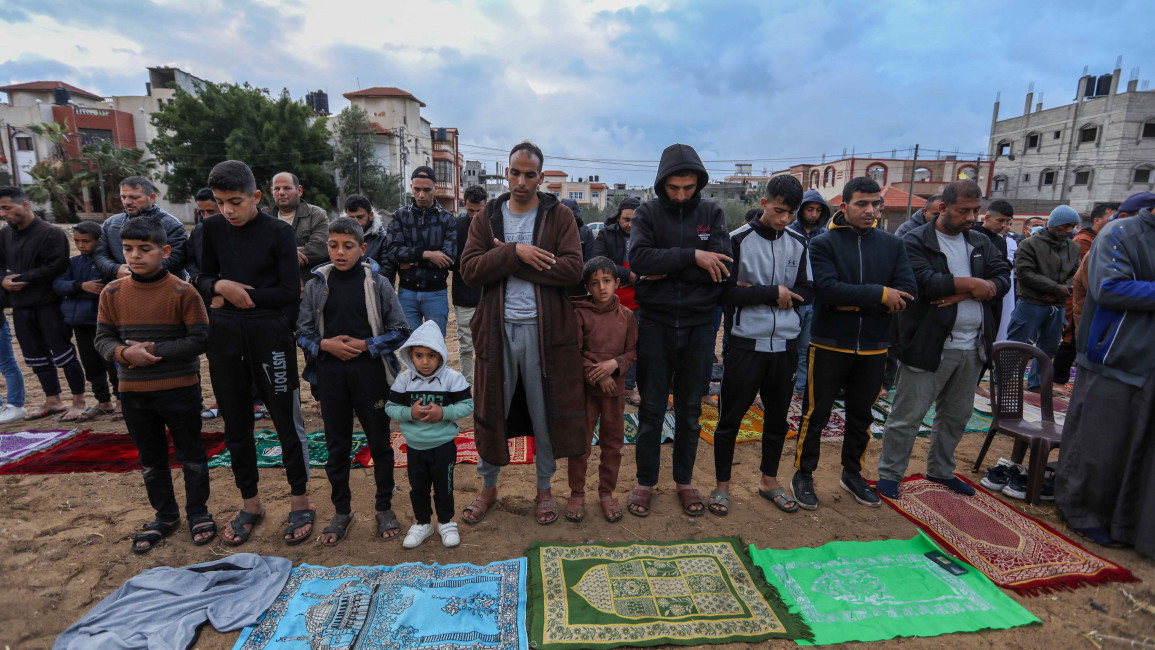This year, celebrating Eid doesn't feel right knowing that Gaza starves
Eid is upon us, marking the end of the Islamic month of fasting, Ramadan. This is the month where the Quran was revealed to the Prophet Muhammad (Peace Be Upon Him), and considered the holiest in Islam.
Muslims mark it by fasting during the day and praying during the night. In it, there is a sense of solidarity. Mosques gather those from all ethnicities to break fast and pray shoulder to shoulder. In between prayers, charity is raised for a common goal.
This Ramadan, prayers have been dominated with asking for the alleviation of suffering in Gaza. Every mosque is raising charity for Gaza in some way. Rarely does it ever happen that all mosques around the UK raise charity for a single cause.
But even with all the prayers and donations, it still doesn’t feel like it’s enough. It’s not unusual to hear those breaking their fast mentioning the sense of guilt they feel eating while those in Gaza starve to death.
"It’s difficult to celebrate with full heart when every Muslim around the globe is acutely aware that a fellow 2.2 million humans will not have the option of food or water this Eid, let alone celebrations"
After 30 days of abstaining from food and water from sunrise to sunset, Eid is usually a welcome celebration of food, drink, gifts, and countless family gatherings.
This year, Eid comes as we mark six months of Israel’s ongoing war on Gaza, which has killed more than 33,000 Palestinians and pushed millions to the brink of starvation.
It’s difficult to celebrate with full heart when every Muslim around the globe is acutely aware that a fellow 2.2 million humans will not have the option of food or water this Eid, let alone celebrations.
As Israel’s man-made starvation in Gaza continues, its citizens are now reportedly resorting to drinking urine for hydration and eating animal feed for nutrition, if they manage to find any.
"Before this unfolding genocide, Gaza was a vibrant Islamic city where prayers echoed loudly through speakers. Now, Gaza’s mosques are silent, as Israel has destroyed almost all of them."@Ahmed_al_sammak on Gaza's bleakest #Ramadan amid Israel's war ⤵ https://t.co/zVqDX0ERWj
— The New Arab (@The_NewArab) April 5, 2024
A recent testimony shared by humanitarian aid doctors on the ground describes them first exiting their vans to “a sea of children, all shorter and thinner than they ought to have been”. A search on social media will provide countless pictures and videos of civilian men, women, and children, all looking like husks of their former selves.
Somehow, starvation is not the only reason for grief this Eid. Just days ago, Palestinians marked the 76th annual memorial of the Deir Yassin massacre. And after 75 years of occupation, Israel’s intensification of brutality during religiously significant times is known all too well.
This was demonstrated most recently as Israeli forces raided Al-Aqsa mosque in one of the holiest nights of Ramadan. Tear gas was hurled at innocent worshippers, and many were beaten all the way to military detention.
In Gaza, Israel operates a different strategy. Intensify the bombing during “iftar”, when families gather to break their fast. Eid will not be spared either, it hasn’t been in the past and it won’t be today.
How can we, then, celebrate it as we have before?
In the build up to Eid, mosques are usually joyous. Plans were discussed for food stalls, ferry rides for the children, and activities for all ages. This year, mosque leaders have often stood claiming celebrations won’t be the same this time. Some have even stated that they personally will not celebrate.
Perhaps there is little comfort in knowing that those of other faiths share in this grief. For many this year, Christmas was not the same either. In Bethlehem, the birthplace of Jesus, there was no Christmas tree or gifts, but a “Jesus under the rubble” vigil for Gaza.
On Easter, the Bethlehem Pastor, Munther Isaac, held another vigil. “Gaza is thirsty, and the world gives it vinegar, much like what happened to Jesus”, he said, as Gaza’s small Christian community faces extinction.
"Kuffiyehs are filling the mosques, chants will sound, and Gaza will be in all our hearts"
Similarly, Pope Francis called for a ceasefire in his Easter address. In the US, several Jewish Rabbis protested for a ceasefire on the first night of Hanukkah. For them, celebration came in the form of disturbing business as usual. Eid won’t be any different.
Any and all Israeli products must be boycotted this Eid, this includes going to franchises known for their support of the occupation like McDonald’s and Starbucks.
Unlike previous years, we ought not to celebrate or share any statements congratulating us for Eid from politicians supporting the ongoing massacres in Gaza.
The wave of protests that have erupted across the region must continue until the apartheid system is abolished.
Kuffiyehs are filling the mosques, chants will sound, and Gaza will be in all our hearts. What will hurt the most, however, is witnessing children running around in their brand new clothes and their best haircuts.
It’s hard to look at them without picturing the tens of thousands of Gazan children who can only smell gunpowder and see blood. While many here will be asking their parents whether they could get that toy or this one, those in Gaza will be desperately hoping their parents would rise and comfort them from beneath the ground.
That, of course, if Israeli bulldozers gave them the privilege of not disturbing their graves.
Omar is an Egyptian-British PhD student at the University of Cambridge, and a pro-Palestinian activist. Whilst his research focuses on immunology and disease, Omar has further interests in politics, religion, and sociology.
Have questions or comments? Email us at: editorial-english@newarab.com
Opinions expressed here are the author's own, and do not necessarily reflect those of their employer, or of The New Arab and its editorial board or staff.



